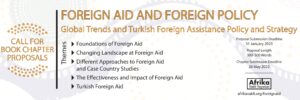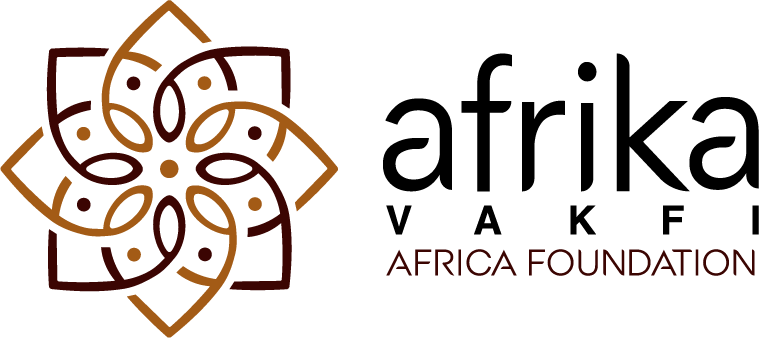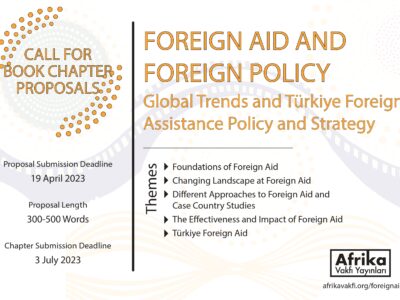FOREIGN AID AND FOREIGN POLICY: Global Trends and Turkish Foreign Assistance Policy and Strategy

FOREIGN AID AND FOREIGN POLICY:
Global Trends and Turkish Foreign Assistance Policy and Strategy
CALL FOR BOOK CHAPTER PROPOSALS
Foreign aid has become a mechanism of interaction among states after World War II. By putting the global development and poverty alleviation on the agenda of international organizations, with its increasing use as a tool of ideological competition during the Cold War and through its reflection as a way of taking responsibility for the former colonialists in the Decolonization process, foreign aid has become one of the main issues of international politics. Foreign aid, which is institutionalized and conceptualized internationally with the Organization for Economic Cooperation and Development (OECD) Development Assistance Committee, is discussed in different contexts in the literature.
The Millennium Summit, organized by the United Nations in 2000 that produced the Millennium Development Goals, has provided a more remarkable and constantly increasing momentum in official development aid (ODA) along with the global economic growth trend in the 2000s. Net ODA, which was 70.3 billion USD in 2000, reached 167 billion USD in 2019 and 196.1 billion USD in 2020 when the world was under the COVID-19 pandemic.
In addition to the Development Assistance Committee (DAC) countries of the OECD, which are known as the traditional donors, with emerging donors such as China, Brazil, and Türkiye, the use of foreign aid leverage in international relations has intensified and, consequently, diverse methods, institutional structures, targets, and strategies have arisen.
With this in mind, Africa Foundation genially invites book chapter proposals for a forthcoming edited volume on foreign aid. The main goal of this call is to explore existing mechanisms, different practices, new approaches, sector-specific applications, and policy recommendations for achieving an effective system of aid.
POSSIBLE TOPICS AND TENTATIVE CONTENT
This tentative draft aims to facilitate the process. The final content will be determined and shared with the authors when the call is concluded.
- Foundations of Foreign Aid
- International Political Economy of Development
- Historical Background of Foreign Aid
- Purposes of Foreign Aid
- Theoretical Approaches to Aid Policies
- International Organizations, Multilateral Aid, Systemic Issues
- Bilateral Aid and Foreign Policy and Foreign Aid Relations
- Changing Landscape at Foreign Aid
- Conditional Lending and Structural Adjustment
- Foreign Aid in the Sustainable Development Context
- Emergency and Humanitarian Crisis Responses
- Foreign Aid’s Impact on Conflict
- Securitization of Foreign Aid
- “International Economic Cooperation”
- Rising Donors
- Financing development (grants, blended finance, crowdfunding, innovative ways of financing)
- Non-state Actors of Foreign Aid
- Different Approaches to Foreign Aid and Case Country Studies
(Analyzing global, regional or emerging donor countries with specific questions, including strategy, foreign policy, impact, sector, region, or implementation tools)
- The USA and Aid for National Security
- Brazil and International Development Cooperation from Critical Perspective
- China and Aid as Development Projects
- India and Transition from a Recipient to a Donor
- Japan and Strategic Assistance
- Nordic Countries and Altruistic Model
- The Effectiveness and Impact of Foreign Aid
- Aid’s Impact on Economic Relations
- International Migration, Diasporas, and Foreign Aid Relations
- Aid’s Impact to Brain Drain
- Concessional Loans and Relationships of Indebtedness
- Situational Analysis of selected aid sectors (e.g., governance, health, education, agriculture, security)
- Needs Analysis (e.g., recommendations for planning and strategy, evaluation and assessment, institutional and financial capacity-building, human resources)
- Monitoring and Evaluation of Foreign Aid
- Turkish Foreign Aid
- History of Türkiye’s Foreign Aid
- Effectiveness of Türkiye’s Foreign Aid
- Sectoral Distribution of Türkiye’s Foreign Aid
- Regional Foci of Türkiye’s Foreign Aid
- New Sectoral Approaches to Development Cooperation for Türkiye (e.g., education, health, governance, local government, security, democracy, human capacity, international scholarships, institution building, media, cultural heritage, agriculture, civil society, digitalization, climate change, wash and sanitation, harmonization)
Proposals should include a 300-500 word abstract with the suggested methodology of work and the theoretical frameworks, as well as the case study for the relevant works and a short CV or biographical statement. All proposals should be sent to the editors by the 30th of December 2022.
If you are accepted, you will be kindly asked to consider the following publication details:
Deadline for complete chapter submission: 26 May 2023
Length: 6,000 – 9,000 words (references included)
The book will be published in English and translated into Turkish by Africa Foundation.
Editors:
Prof. Dr. Mesut Özcan ([email protected])
Dr. Mehmet Köse ([email protected])
Project Assistant:
Hacer Atabaş ([email protected])

